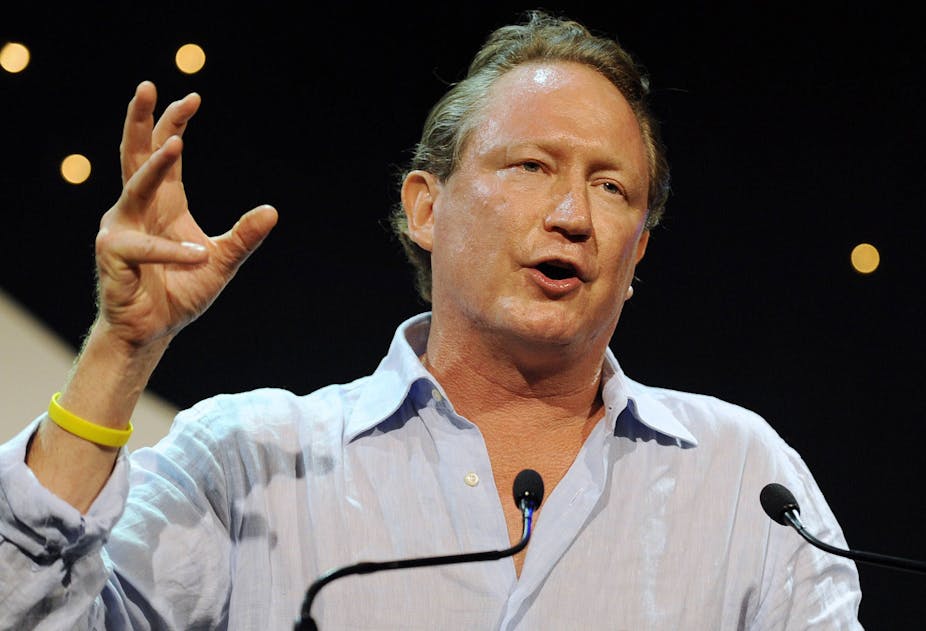Andrew Forrest, one of Australia’s wealthiest mining magnates, has announced his resignation as chief executive of Fortescue Metals Group.
In a statement released to the ASX, Fortescue Metals Group Chairman Herb Elliott said Forrest intended to focus more time on philanthropic activities, particularly for indigenous Australians.
Forrest’s resignation will be effective from 18 July, but the statement says Forrest has accepted a role as Chairman of Fortescue.
Forrest denies the move is designed to soften the blow of a High Court appeal against a Federal Court decision finding he breached his director’s duties, saying he does not expect the case to go against him.
The appeal centres around a Federal Court ruling which found it misled the market and contravened the Corporations Act by releasing information that drove up the miner’s share price. Forrest faces being banned as a company director.
Earlier this year, the Full Federal Court overturned the decision of the trial judge and upheld the corporate regulator’s claim that both Fortescue and Forrest had misled the market when announcing ‘binding infrastructure agreements’ with a Chinese consortium which, in reality, were merely agreements to negotiate to develop infrastructure in the Pilbara Region.
Forrest was held to have failed to act with appropriate care and diligence by allowing Fortescue to commit breaches of corporate law through failure to take steps to correct the misleading impression made on investors.
The case was remitted back to the Federal Court to assess penalties - this is yet to happen.
The potential penalties arising from a breach of misleading and deceptive provisions of the law includes a pecuniary penalty (payable to the Commonwealth Government) and a banning order from management.
As chief executive, Forrest would have little or no choice but to step down unless he could convince the court of the resulting hardship from being disqualified to act as director.
The penalty decision, however, will be stayed if the High Court grants Forrest leave to appeal, which is still in the pipeline.
It could take some months before a decision on this matter is known.
Meanwhile, should the High Court reject permission to appeal, Forrest will certainly be subject to a penalty decision and the prospects of receiving just a slap on the wrists do not appear to be good.
In recent years, there have a number of cases involving directors found liable for allowing their companies to make misleading and deceptive announcements to the market.
In litigation involving Citrofresh Ltd, director Ravi Amrit Narain was ordered to pay a pecuniary penalty of $20,000, but more importantly, was also disqualified from managing corporations for seven years.
In determining the disqualification period, the court rejected the director’s call for a lesser penalty.
Significantly, the court said that lacking professional experience as a director, whether in a publicly listed company or not, was not a ground to be exempt from a banning order.
Moreover, the court was of the view that a serious penalty was deserved because the director’s conduct placed the company in jeopardy by exposing it to legal action and harming its financial interests and reputation.
Ominously, similar claims can be made in a penalty hearing against Forrest should such a case proceed.
Forrest is a long standing and highly experienced director of a publicly listed company whose conduct was held by one of the judges in the Full Federal Court to cause harm to the company.
There are some parallels between the legal issues arising in decided cases, including the James Hardie case which is subject to High Court appeal, and the potential penalties in store for Forrest should the penalty case proceed.
Against the backdrop of these uncertainties and potentially debilitating penalties, it makes a lot of commercial sense for Forrest to step down at this particular point to ensure a smooth transition in management of the company.
The market hates uncertainty and is easily spooked by the announcement of sudden departures of CEOs with the company being left in a lurch.
Viewed through the lens of good corporate governance practices, the imminent resignation of Forrest appears to be a well choreographed response to the legal uncertainties and challenges which lies ahead for the current CEO.
In a worst case scenario, if subject to a banning order, a removal from the position of Chairman may be viewed as less traumatic for the market and investors.

